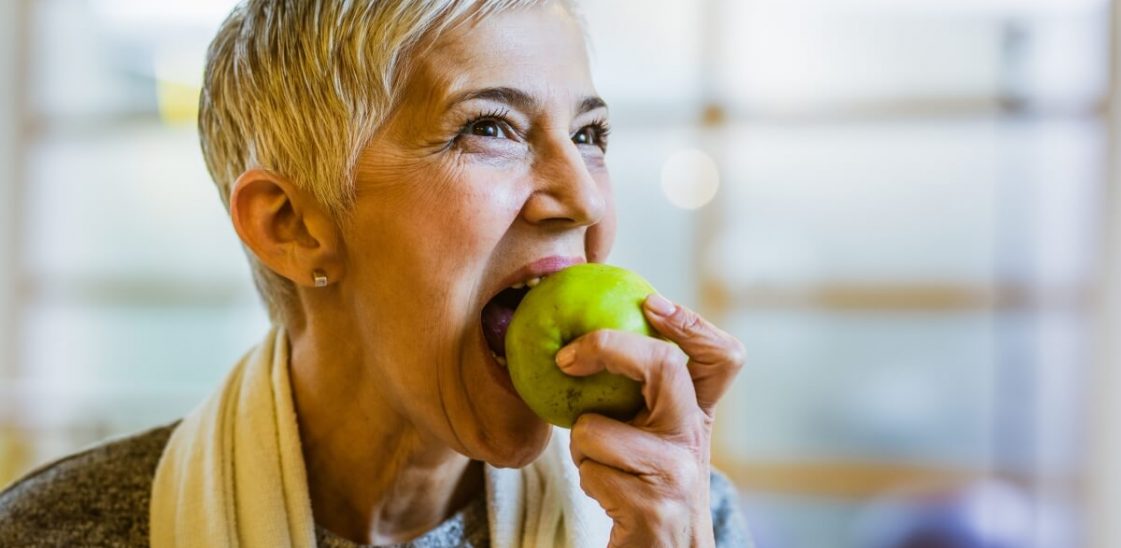
What foods are good for your teeth?
Maintaining good dental hygiene isn’t just about how well you clean your teeth – it’s also about what you put in your mouth. When we eat or drink, we’re essentially coating our teeth and gums with bits of whatever we’re consuming. Very small particles of food will remain in your mouth even after you swallow, and those particles can have an effect on your teeth.
So how do you know if what you’re eating is harming your teeth? Well, let’s take a look at the kinds of food you should embrace, those you should avoid, and what you can do between meals to keep your teeth as clean and healthy as possible.
What food is good for teeth?
Dairy
Cheese, milk and yoghurts are good sources of calcium and protein, which help to strengthen the enamel on your teeth. Dairy products are also believed to increase the pH levels in your mouth, reducing the amount of acid your teeth are in contact with, while probiotic yoghurts can boost the levels of good bacteria in your mouth.[1]
Leafy greens
These salad favourites are known for being high in various vitamins and minerals, so it’s no surprise they’re good for your teeth, too. Like dairy products, leafy greens contain calcium – but they’re also high in folic acid, which may help prevent gum disease.[1]
Apples
An apple a day keeps the dentist away – or something like that, anyway. Apples have a fibrous texture that stimulates the gums, and the simple act of crunching through a single apple can have an effect similar to brushing your teeth. Eating an apple can boost saliva production, which can help to wash away any bacteria remaining in your mouth after eating.[1]
Carrots
Good for more than just seeing in the dark! With a similar effect to apples, the crunchy nature of a raw carrot can help to clean your teeth by making extra saliva. By washing away those pesky remnants, they help to prevent cavities and keep your mouth fresh.[1]
Almonds
Like dairy products, almonds are high in protein and calcium – both key ingredients for a healthy smile. They’re also low in sugar, so they’re a good choice whether you’re looking for a guilt-free snack or a little something to top off your meal.[1]
What food is bad for your teeth?
Sugar
You’ve likely heard time and time again that sugar is bad for your teeth, but do you know why? When you eat sugar, it makes your mouth acidic, which damages the enamel on your teeth. For this reason, it’s better to leave intervals of longer than two hours between consuming sugar, otherwise your teeth will be constantly swimming in acid.[2]
Citrus fruits
Eating your five a day is a key part of maintaining a healthy diet, so it may come as a surprise that citrus fruits can be bad for your teeth. The reason is that they’re full of citric acid, the stuff that gives them their zing. This acid can damage your teeth, so limiting how many limes, lemons, oranges and grapefruits you eat could be safest.[3]
Pickles
Vinegar is very acidic, and pickles are full of vinegar – so eating that gherkin could damage your teeth more than you think. Eating pickles regularly can contribute to tooth decay and increase your risk of other dental problems – so try to eat them in moderation.[3]
Wine
It’s not just foods that can damage your teeth – wine is another culprit for tooth decay. Although you might not taste it the way you can with citrus fruits and pickles, wine is also acidic, and can compromise your teeth’s enamel. The tannins in red wine can also dry your mouth out, meaning there’s less saliva to wash away the bacteria.[3]
Should you clean your teeth after eating?
After hearing all that, you might be itching to get your toothbrush out – but don’t do it immediately. Brushing your teeth too soon after eating can damage the enamel by scrubbing at it while it’s still soft from the acid attacks. It’s best to wait between 30 minutes to an hour after eating to brush your teeth – and that goes for using floss picks and interdental brushes, too.
If you do want to clean your mouth soon after eating, stick to rinsing with water or mouthwash, as these are less harsh forms of cleaning.[4]
Resources:
[1] https://www.dentalhealth.org/blog/10-foods-and-drinks-with-surprising-oral-health-benefits
[2] https://www.nhs.uk/live-well/eat-well/food-types/how-does-sugar-in-our-diet-affect-our-health/
[3] https://www.dentalhealth.org/diet-and-my-teeth
[4] https://www.nhs.uk/live-well/healthy-teeth-and-gums/how-to-keep-your-teeth-clean/




